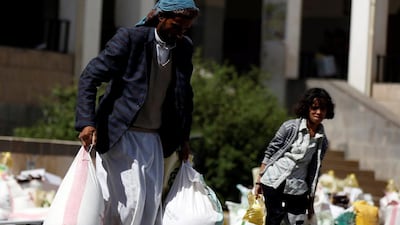NEW YORK // The United Nations humanitarian chief has warned the world that Yemen is headed for total collapse as the international community fails to take action to end the conflict in the country and help the millions of people at risk of starvation.
Stephen O’Brien told the UN Security Council on Tuesday that countless previous warnings had gone unheeded, both by the warring parties and by the rest of the world.
“As I have previously briefed this council in recent months, urgent action is required to stem the suffering and yet, based on facts and as ever in complete candour, I return here to report the situation on the ground has continued to spiral downwards towards a total social, economic, and institutional collapse,” he said, the frustration clear in his voice.
“Yemen now has the ignominy of being the world’s largest food security crisis with more than 17 million people who are food-insecure. Crisis is not coming, it is not looming, it is here today – on our watch and ordinary people are paying the price.”
He spoke after the UN secretary-general’s special envoy to Yemen, who offered an equally desperate picture of suffering in the war-torn country as he briefed the Security Council on his efforts to find peace.
Apart from averting a military attack on the Red Sea port of Hodeida, which would have prevented food and medical supplies from entering Yemen and caused devastating loss of life, Ismail Ould Cheikh Ahmed could offer only an otherwise gloomy assessment.
“Tragically the violence continues on numerous fronts, deepening the suffering on the Yemeni people,” he said.
Mr Ould Cheikh Ahmed experienced the dangers first-hand on Monday last week when a convoy he was travelling in from the airport in Sanaa to the city’s UN compound came under fire. He was in the Yemeni capital as part of an effort to bring the warring parties together.
“I will not hide from this council that we are no closer to a comprehensive agreement,” he said. “The reluctance of the key parties to embrace the concessions needed for peace, or even to discuss them, remains deeply troubling. Yemenis are paying the price for their delays.”
A quarter of Yemenis cannot afford to buy food in local markets, he added.
Yemen has been badly affected by more than two years of war and decades of instability. The UN says almost 5000 civilians have been killed in clashes between Houthi rebels and pro-government Yemeni forces backed by a Saudi-led military coalition. The result is a catastrophic humanitarian emergency.
Some 19 million of Yemen’s 28 million population need humanitarian assistance. Aid agencies say about seven million people are on the brink of starvation. More than 462,000 children are suffering from malnutrition.
Years of fighting have destroyed or damaged more than half the country’s health facilities and two-thirds of the population do not have access to clean drinking water.
Conditions have deteriorated further in recent months with a deadly outbreak of cholera, which has killed at least 471 people, according to figures released by the World Health Organisation on Monday.
Before the Security Council meeting on Tuesday, 22 aid agencies, including Oxfam, Action Against Hunger and the International Rescue Committee, called on the UN to end what it called a year of inaction.
“Yemen’s crisis is man-made,” they said in a joint statement. “It is a direct result of the armed conflict and cannot be solved with aid alone. It requires a political solution. It also requires that countries, including members of the Security Council, who are fuelling the conflict by supplying arms that are at risk of being used in the conflict cease doing so immediately.”
Matthew Rycroft, the UK’s permanent representative to the UN, said it was difficult to see any results from the process led by Mr Ould Cheikh Ahmed but that he retained the Security Council’s confidence.
“He has our full support,” Mr Rycroft said. “He has put himself in physical danger personally but I think it’s a sign of his courage and his commitment that he is not being put off. He stayed in Sanaa for that round of meetings. He will go back whenever he judges it necessary and I think it’s important that we all get behind him, give him our full backing at this difficult time for the people of Yemen.”
foreign.desk@thenational.ae
* With additional reporting by Agence France-Presse

